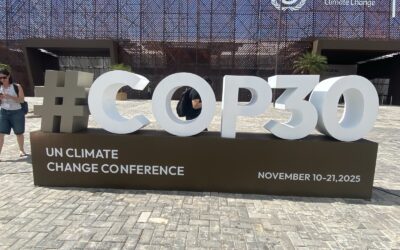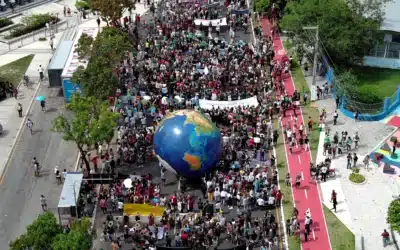By Coraina de la Plaza, Global Forest Coalition
Last March, from the 8th to the 10th, the 12th meeting of Green Climate Fund (GCF) Board took place in its headquarters, in Songdo, South Korea. There were many items in the agenda to be discussed, a number of decisions were adopted and after some new pledges, the project pipeline is now USD 1.5 billion, getting closer to the goal of reaching USD 2.5 billion in 2016. However, while the operationalization and functioning of the Fund is moving forward relatively quickly, the Fund is also drifting towards a dangerous path due to some of the Board´s decisions and the priorities set for this year.
In November, prior to the COP-21 in Paris, the first batch of 8 projects to be funded by the GCF was approved, which considering the relative “youth” of this mechanism is an important step to attain the Fund´s goals. However, these projects were approved in a rush to show that money is already flowing and to be able to deliver results at the COP-21. This rush generated a debate about the integrity of the process and even Board members, such as the Egyptian member, Omar El-Arini, and the US representative, Gabriel Quijandria, complained because there was not agreement on, for instance, a set of criteria; in fact, the latter said “We are building the plane as we fly the plane”[1].
Speaking of the COP, the GCF will serve the Paris Agreement, and the Secretariat will present in the upcoming meeting in June, a proposal to support both COP- related decisions and the COP-21 Paris Agreement.
Moreover, some of the project´s proposals were quite polemic in terms of co-funding, the definition of climate change adaptation, human rights and the adopted interim safeguards[2] being too loose in terms of rights and participation of Indigenous Peoples and local communities. The most polemic project involving Indigenous Peoples is the Wetlands project in Peru. AIDESEP, a Peruvian Indigenous Peoples Organization, already highlighted the negatives experiences of indigenous people’s organizations that had previously worked with PROFONANPE, the Implementing Entity (IE). In fact, the way in which PROFONANPE have carried out the consultation processes seem to have led to conflicts within communities and among indigenous organizations[3].
The accreditation by the Board of some entities was also a polemic agenda item during the last meeting. The Board has made a considerable effort to operationalize the accreditation process and, as of March 2016, there are a total of 33 accredited entities. Sadly some of the entities accredited during this meeting have a rather dark background. For instance, despite several calls from CSOs to stop their accreditation, the Board gave HSBC and Credit Agricole green light, becoming accredited entities. HSBC and Credit Agricole have been accused of money laundering, involved in financial scandals and economically supported the coal industry for many years. Although the approval was made under “some conditions”, this could compromise the integrity of the Fund.
Another key outcome of the meeting was the approval of the GCF Strategic Plan (SP) which will “guide the Board in addressing policy gaps and channel the Fund’s resources of the initial resource mobilization period between 2015 and 2018, and to invest the Fund’s resources in transformational climate actions in a country-driven manner”, and is defined as a living document. Overall, developing countries Board members advocated for the relevance of the Fund to empower National Designated Entities (NDAs) instead of accredited entities, and raised questions about the Fund´s portfolio. On the other hand, developed countries Board members pushed for a stronger gender component in the Strategic Plan, strengthening of the private sector and to go for results-based payments beyond REDD+. After consultations and deliberations, the adopted Strategic Plan prioritizes a pipeline development by “operationalising results-based payments for REDD+ in line with (UNFCCC’s) COP guidance and the Governing Instrument (of the GCF), evaluating the implementation of results-based payments, and assessing its applicability to other sectors within the purview of the GCF“.
The decision of operationalizating results-based payments schemes as a priority in the Strategic Plan is quite worrisome, mainly taking into account the rather loose safeguards that the Fund is currently using. There are plenty of examples around the world that prove how market-based approaches, including REDD+, lead to land-grabbing, jeopardizes local land rights, violate Indigenous Peoples and communities´ human rights and can have many other negative impacts on both society and environment. In addition, the GCF has yet to develop its own set of safeguards. The Fund is currently using the International Finance Corporation (IFC) Environmental and Social Performance Standards as its interim safeguards, which have been heavily criticized as too weak for this Fund, mainly in terms of human rights. Therefore, the operationalization of results-based payment approaches along with an inadequate set of safeguards can pose important threats Indigenous Peoples and local communities’ livelihoods and rights.
Besides the urgent need to adopt an appropriate set of social and environmental safeguards and compliance system, the Fund should also focus on prioritizing initiatives to mitigate and adapt to climate change emanating from Indigenous Peoples and local communities and try to scale-up those initiatives. On the top of the social and environmental benefits that these initiatives had proved to have[4], they usually do not required large amounts of money. Therefore, the GCF should also consider the development of an Enhance Direct Access window for Indigenous Peoples and local communities’ initiatives as a priority for the SP.
Moreover, the GCF counts with a gender policy to enhance gender sensitive approaches and recognizes the importance of gender considerations in terms of impact and access to climate funding. In March, the board also decided to review the gender policy and the gender action plan in the meeting that will be held in December 2016. While the GCF has included key gender references since the approval of its governing instrument, there is still room for improvements. For instance, at the project level, there are not mandatory gender indicators for performance measurement; strengthening of stakeholder participation at all levels, making emphasis on the need of the participation of women groups and representatives; and the need to achieve gender balance in, for instance, the GCF Board composition, being as of April 2016, 3 women and 20 men.
Another essential element is the participation of civil society in the GCF decision-making processes during the meetings and via the GCF website. During meetings, CSO participation is mainly done through two active observers which are invited by the co-chairs to intervene. The rest of observers have to sit back and watch the meeting from an overflow room. Considering the ambitious goals and scale of the Fund and hence, its potential (positive and negative) impacts, this is a rather small number of CSO active observers and the Board should boost this number.
In addition, public calls for inputs are made trough the GCF website which, on the top of not being particularly user-friendly, contains all relevant materials and information only in English, disallowing many actors to provide inputs and be properly informed. This is especially worrisome considering some of the current issues at stake. For instance, the last call for public inputs was on the Environmental and Social Management System (ESMS), a key element for, among other things, the development of the Fund´s social and environmental safeguards. In order to overcome this problem, there was a request to the Secretariat to have relevant documents translated into more languages and improve the website.
Transparency, means and information disclosure were, once again, a controversial topic during this meeting. The insufficient transparency in terms of information disclosure about which the entities that apply for accreditation are, and the process of accreditation itself, has been heavily criticized by CSOs. Likewise, the Information Disclosure Policy of the Board contains a rather long list about information that would not be disclosed, i.e. deliberative information exchanged, prepared for or derived from the exchanges between the GCF and its accredited entities or third parties as well as information pertaining to the GCF’s own internal deliberative processes; certain financial information; board proceedings, including, pre-meeting documents, that are deemed confidential; and trust funds reports.
On the bright side, and after a long fight from CSOs, active Observers and some Board members, live web streaming of meetings was finally approved. Although this should have been done from the very beginning as essential to show commitment to transparency and accountability, allow people with low resources to follow the processes plus reducing part of the CO2 emissions derived from the travelling, let´s be positive, this decision is an improvement in terms of transparency.
Overall, and taking into account the common slowness of processes and operationalization of international policies, mechanisms, programmes, etc., the GCF is delivering results at a relatively quick pace. However, the path followed with some of the last developments, and the reluctance of including as a priority in the work plan and SP some key issues such as the need to have its own safeguards, more transparency in accreditation processes, strengthening the role of national designated entities instead of accredited entities, the focus on result-based payment mechanisms, and many more, is drifting the GCF towards a dangerous and well-known “business as usual” path.
[1] http://www.climatechangenews.com/2015/11/06/green-climate-fund-approves-first-eight-projects/
[2] The GCF has yet to develop its own Social and Environmental set of Safeguards. Currently, it has adopted the IFC Performance Standards.
[3] http://www.forestpeoples.org/sites/fpp/files/publication/2015/12/briefingpaper-fpic-ippolicy_0.pdf
[4] See for instance the Community Conservation Resilience Initiative
*Coraina de la Plaza is Global Forest Coalition’s Indigenous Rights Advisor and Research Assistant. She follows this issue closely




